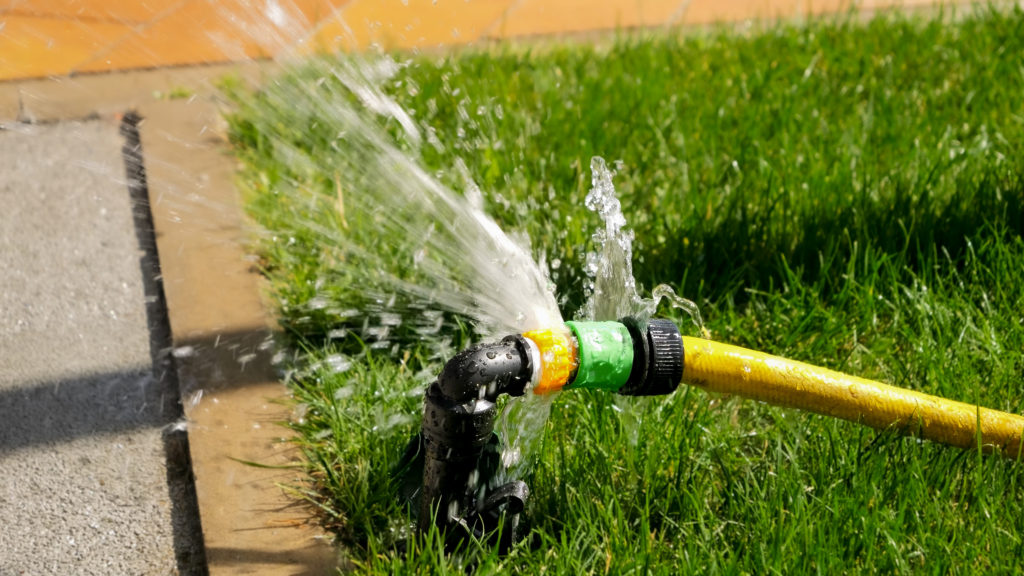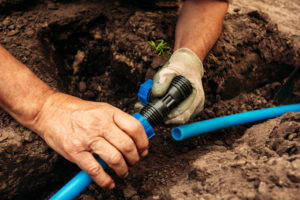Guide To Checking And Fixing Home Leaks
March 29, 2024

Broken Irrigation Pipe
Our homes are filled with countless pipes to help us meet our water needs. However, if these pipes leak, they can cause water loss and pollute Orange County’s waterways. Thankfully, they’re fixable, especially if you check for them regularly.
Property owners are responsible for maintaining their pipes and are liable for any leaks that originate from their property. Whether you live in a multifamily home with a backyard or studio apartment, these tips can help conserve water and help our water bodies thrive. Keep reading to learn everything you need to know about leaks on your property!
Why Are Leaks Problematic?
Leaks can occur anywhere water flows on your property including toilets, faucets, showerheads, and irrigation systems. Whether they are obvious or hidden, all leaks can be harmful. Here are some reasons why:
First, they cause water loss.
The EPA estimates that household leaks in the United States lose 1 trillion gallons of water annually, which is equal to the yearly water use of over 11 million homes. Water is a precious and finite resource that we must preserve and recycle instead of waste.
Second, outdoor leaks can contribute to pollution in our waterways.
A small irrigation system leak just 1/32nd of an inch wide (the thickness of a dime) can cause 1,538 gallons per week to flow from your property into local storm drains. This lost water can carrying pollutants like dirt, leaves, and pesticides untreated into OC’s water bodies.
Third, leaks are costly, inflating water bills and hurting your bank account.
Who wants to spend more money when they don’t have to? Not us. Keep leaks away and fix them quickly to save the money you work so hard for.
Let’s learn how to check for leaks so they can be addressed before they get out of hand.

How to Check for Leaks?
Leaks can run, so don’t let them hide! Here are some ways to check for leaks:
Outdoors:
- Run and observe your irrigation system through its entire cycle at least twice per year to identify leaks, broken or misaligned sprinkler heads, and areas of ponding or runoff.
- Check how tightly your hose is connected at the spigot.
- Survey your property for unusually soggy or wet areas.
- Look for excessive plant growth.
Bathroom:
- Place a drop of food coloring in your toilet tank and wait at least 10 minutes. If any color appears in the bowl, you most likely have a leak.
- Turn on the shower to see if there are any drips or errant sprays.
- Turn on the tub and then divert the water to the shower to evaluate if there is still water flowing from the faucet.
Kitchen:
- Listen for any drips when the faucet is both on and off.
- Look under the sink and appliances for rust and pooling water.
Laundry Room, Basement, or Utility Room:
- Check under the utility sink, washing machine, and water heater for pooling water, rust, or other signs of leakage.
General Home:
- Stop using the water for a couple of hours and look at your water meter before and after this period. If the meter changes, you likely have a leak.
- Walk throughout your house to see if there is any moisture or mold on your walls, ceilings, or floors, or if there are any wet areas or excessive plant growth outdoors. If you see any of these signs, a pipe is propbably leaking.
- Track your water bil over timel. If it’s significantly higher from the previous bill or from the bill you received for the same month the year prior and your water habits haven’t changed, there is likely a leak.
Now that you know what to look for, let’s talk about how to fix these leaks!

How To Fix Leaks
If you find a leak in or around your home, don’t panic. Many leaks can be taken care of with simple and easy fixes. Most local home improvement stores have the supplies necessary for repairing minor leaks on your own. For more serious leaks, or if you’re a hands-off person, contact a plumber or irrigation professional. Once work is completed, monitor your water meter and bill to ensure the problem was adequately fixed.
Outdoors:
- Replace sprinkler heads in your irrigation system if you notice they are leaking or broken.
- If you notice misaligned sprinklers, ensure they aren’t leaking and turn them to the water the intended landscaped areas. Depending on the sprinkler head style, you may need a wrench.
- For small leaks to home irrigation PVC pipes, fiberglass resin tape, epoxy putty, or pipe burst tape can be effective solutions. However, it’s likely best to contact a professional for pipe leaks.
- If your garden hose leaks even though it is securely attached to the spigot, the hose connector’s rubber washer may need to be replaced.
- If leaks persist, the problem gets worse, or the pipes themselves are leaking, contact a professional.
Indoors:
- For toilets, showerheads, or faucet leaks, new flapper valves, Teflon tape, washers, and gaskets can usually do the trick.
- Moisture or mold in walls, ceilings, and floors can indicate a more serious leak and may require professional repair services.
Overwatering Is Out
Take action to prevent leaks and fix them as soon as they occur. For additional tips on irrigation maintenance to conserve and recycle water, our Overwatering Is Out initiative provides simple tasks ranging from little effort to bigger tasks aimed to help OC residents ensure their homes water efficient.
Learn about and commit to water-wise actions like repairing and properly aligning sprinklers, and installing a rain barrel for collecting and reusing rainwater. After completing tasks like these, join the Overwatering is Out movement by adding your actions to our map and sharing it with your friends and neighbors.
No leak is too small when it comes to conserving water, saving money, and keeping OC’s waterways healthy. By following these tips, you can make a difference in the effort against leaks, no matter if you live near the Santa Ana Mountains or the beach. Thank you for keeping your home leak-free!